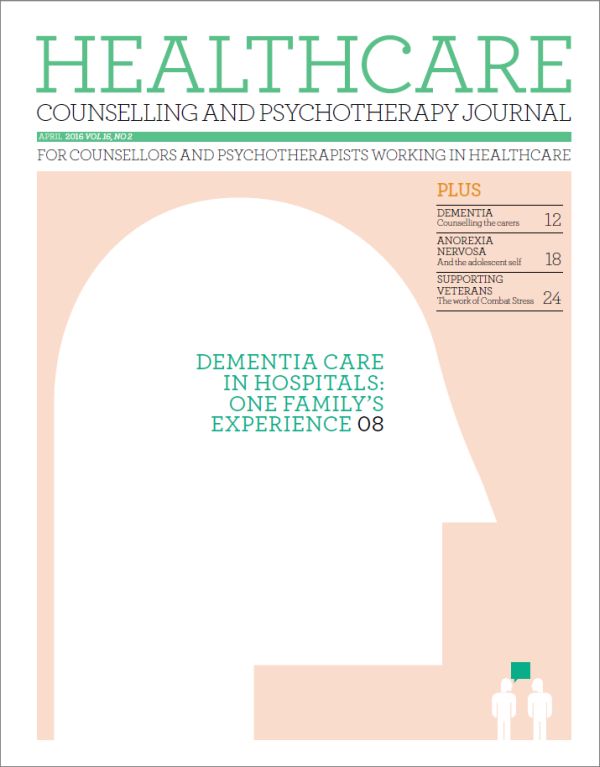In this issue
Features
Dementia care in hospitals (free article)
Julie Vernon recounts one family’s experience, and asks – is it good enough?
Counselling the carers
Danuta Lipinska considers how counselling can help carers of people with dementia cope in often overwhelming circumstances
How do counsellors view and practise self-care?
Elisabeth Brownlee’s research gives an interesting insight
Anorexia nervosa and the adolescent self
Psychotherapy can help patients with anorexia blossom into the person they really are, writes Wendy Jones
Supporting veterans
Dominic Murphy explains the clinical pathways at Combat Stress for veterans with post-traumatic stress disorder
Connecting in Northern Ireland
Rachel Johnston reports on her work for the BACP Healthcare division in setting up counsellor networks
Regulars
Chair’s report – BACP Healthcare
Zubeida Ali
Healthcare update
Judy Stafford
Third sector perspective
Michael Lilley

A pdf of this issue is available in the Healthcare Counselling and Psychotherapy Journal archive
From the editor
Anyone who has gone through illness knows how vulnerable, alone and powerless it can make you feel. When a family member has dementia, the family may also feel that vulnerability acutely, as Julie Vernon expresses powerfully. Julie describes what happened when her mother, who has dementia, had to be hospitalised. Communication gaps between hospital and family, and a lack of awareness by staff of how to care for her mother’s needs, did little to ease the stress of either Julie’s mother or the family members who cared for her. Rather, they compounded it. Better dementia awareness training for staff in hospitals could make the experience so much better for patients and carers is this author’s clear message.
Experiences like Julie’s are familiar to counsellor Danuta Lipinska, a specialist in ageing and dementia care, who herself has been a carer to family members with dementia. Danuta comprehensively describes the ‘increasing and ongoing stress and strain’ of being a carer of someone with dementia, and how counselling can empower carers to move from situations of vulnerability, including depression, anxiety and feelings of hopelessness, towards hope and the return of a measure of self-agency.
From vulnerability in older age, to vulnerability in younger people: psychotherapist Wendy Jones considers the relationship between anorexia nervosa, which often surfaces around puberty, and self-identity; and relates how, as they move through the therapeutic process, people with anorexia can be helped to develop, or redevelop, a healthy and stronger sense of self as they ‘fill out’ in all ways into who they really are. As someone who suffered with an eating disorder in my early teens, Wendy’s article reminded me how particularly vulnerable young people are.
Having experienced conflict, ex-servicemen and women are another potentially vulnerable population group, and one which may require extra support to overcome barriers to seeking help, psychologist Dominic Murphy, of the charity Combat Stress, explains, as he outlines the clinical pathways available through the organisation for veterans experiencing post-traumatic stress disorder.
And finally, with counsellors’ responsibility to attend to self-care vital in order to maintain wellbeing and protect against vulnerability to the stresses of practice, Elisabeth Brownlee’s research is interesting. Elisabeth gathered the views of trainee and new counsellors on how they feel about self-care, and how they actually do it. The replies give food for thought.
Vulnerability runs as a common thread through the articles in this issue. The therapeutic process, as they also demonstrate, can be a powerful tool in moving people from a place of vulnerability to one of self-awareness, empowerment, strength, and ultimately healing.
Jacqui Gray
Acting editor
hcpj.editorial@bacp.co.uk
